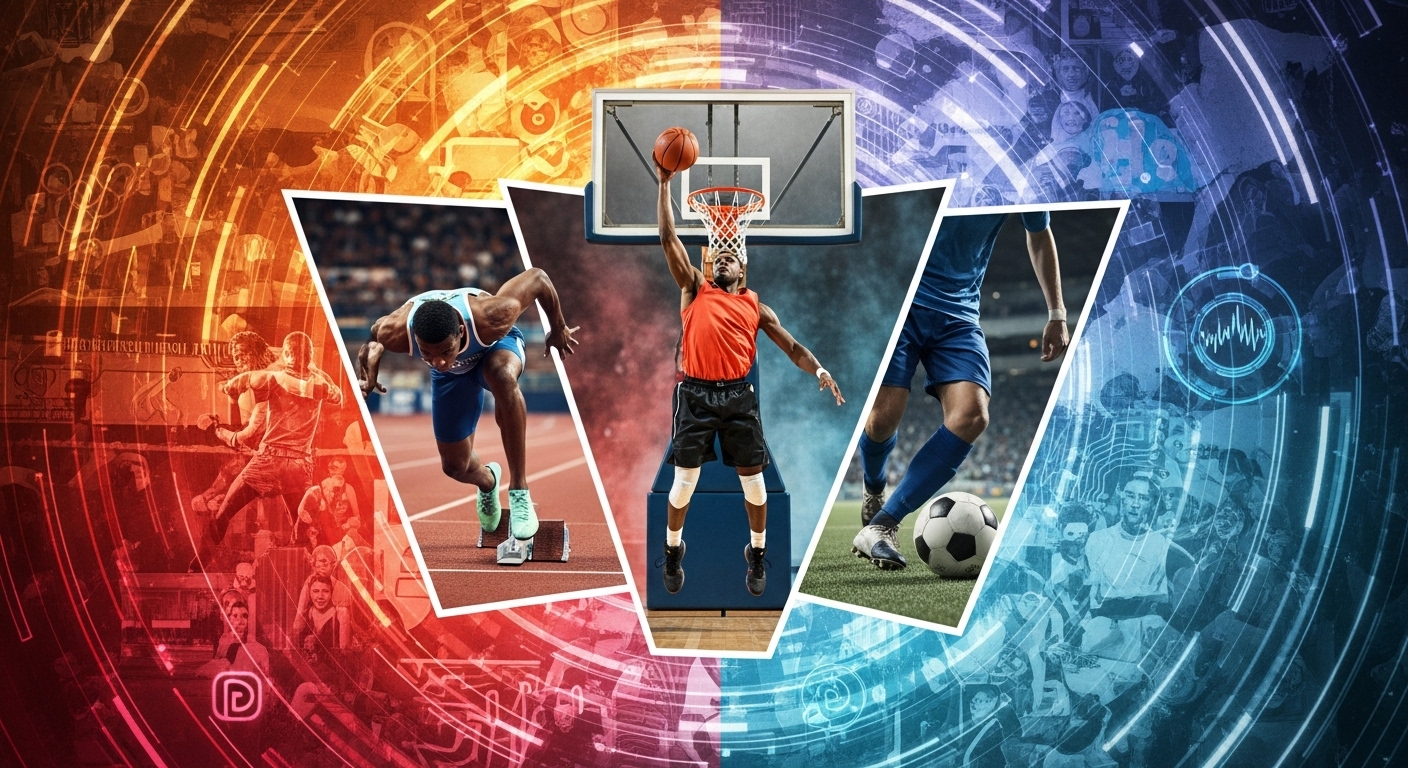Sports have been an integral part of human civilization for thousands of years, shaping cultures, inspiring unity, and defining moments that transcend generations. From ancient Olympic games in Greece to modern mega-events like the FIFA World Cup and the Olympics, sports continue to be a powerful force that connects people from all walks of life. They embody the spirit of competition, the beauty of teamwork, and the pursuit of excellence. In this blog, we will explore the evolution of sports, their impact on society, the role of technology, and the emotional and psychological aspects that make sports so compelling in the modern world.
The Ancient Roots of Sports
Sports were born out of the basic human instinct to compete and survive. In ancient civilizations, physical contests were not only a means of entertainment but also preparation for warfare and survival. The Greeks, for example, held the Olympic Games as a tribute to Zeus, where athletes competed in running, wrestling, and chariot racing. Similarly, the Romans celebrated gladiatorial contests, while in ancient China, martial arts emerged as both a form of defense and a cultural practice.
In these early forms, sports were deeply tied to honor, religion, and community. Athletes were celebrated as heroes, and their achievements symbolized not just personal success but the pride of entire nations or city-states. The ancient Olympic Games, held every four years, laid the foundation for the global sporting events we celebrate today.
The Rise of Modern Sports
The 19th and 20th centuries witnessed the formalization and global spread of sports. The industrial revolution played a key role by creating structured leisure time, organized clubs, and public stadiums. England became the birthplace of many modern sports such as football, cricket, rugby, and tennis. The codification of rules transformed local pastimes into international competitions.
The re-establishment of the Olympic Games in 1896 by Pierre de Coubertin marked a new era for global sports. The vision was to promote peace and unity through athletic excellence. Over time, other major events like the FIFA World Cup, the Tour de France, and the Wimbledon Championships followed, each adding its own flavor to the international sports culture.
These developments not only professionalized sports but also introduced the concept of sportsmanship, fair play, and the importance of discipline and respect both on and off the field.
The Globalization of Sports
In today’s interconnected world, sports have become one of the most universal languages. Regardless of nationality, religion, or language, people unite to celebrate athletic excellence. The globalization of sports has been fueled by media coverage, international leagues, and the internet. Football, basketball, and cricket are now watched by billions, creating massive global fan communities.
Athletes such as Lionel Messi, LeBron James, and Serena Williams are not just players but global icons representing dedication, resilience, and excellence. Major sporting events now attract massive economic investments and cultural exchange. Countries compete not just for medals but for prestige, recognition, and influence.
The rise of global tournaments has also led to the blending of cultures. Athletes train abroad, fans follow international teams, and sports merchandise travels across continents. The impact of globalization has transformed sports into a massive industry, bridging gaps and fostering understanding among people worldwide.
The Role of Technology in Sports
Technology has revolutionized every aspect of sports, from training and performance to broadcasting and fan engagement. In the past, athletes relied primarily on natural talent and basic training methods. Today, data analytics, wearable devices, and video analysis have brought science into every movement of the athlete.
For example, sensors and smart wearables help track heart rate, muscle strain, and fatigue levels. Coaches analyze real-time data to adjust training routines for maximum efficiency. In football, video assistant referee (VAR) technology ensures fairness, while in tennis, electronic line-calling systems like Hawk-Eye make precise judgments.
Sports broadcasting has also undergone a massive transformation. Fans can now stream matches in ultra-high definition, track player statistics instantly, and even experience games in virtual reality. Social media platforms allow athletes to connect directly with their fans, giving rise to a new kind of sports celebrity who influences millions with a single post.
The Psychological Impact of Sports
Sports are not just about physical strength; they are equally about mental toughness. The pressure of competition, the weight of expectations, and the need for focus under stress test an athlete’s psychological resilience. Sports psychology has become an essential part of modern training, helping players build confidence, manage anxiety, and maintain motivation.
Moreover, sports serve as a powerful outlet for emotional expression for both players and fans. The thrill of victory and the agony of defeat evoke deep human emotions. Fans feel connected to their favorite teams, often treating their success as personal triumphs. This emotional investment fosters a sense of identity and belonging.
Participating in sports also helps individuals develop life skills such as teamwork, leadership, and discipline. For children and youth, it builds confidence and teaches the importance of persistence and respect. In professional athletes, mental health awareness has become a major focus, as the intense pressure of performance can sometimes lead to burnout and anxiety.
The Economics of Sports
Sports have evolved into a trillion-dollar global industry encompassing broadcasting rights, sponsorships, merchandising, and tourism. Major leagues such as the NFL, NBA, Premier League, and IPL generate immense revenue, while athletes sign multimillion-dollar endorsement deals. Cities hosting events like the Olympics or World Cup witness a surge in tourism, infrastructure development, and global recognition.
However, the financial aspect of sports has also brought challenges. The commercialization of games sometimes overshadows their original spirit. Ticket prices, sponsorship deals, and media rights often dominate discussions more than athletic achievements. Yet, the economic engine of sports continues to power opportunities for players, coaches, and countless supporting industries around the world.
Women in Sports: Breaking Barriers
Historically, sports were a male-dominated domain, but the tide has changed dramatically. Women have risen to prominence across all sporting disciplines, breaking records and stereotypes alike. Legends like Serena Williams, Simone Biles, and Megan Rapinoe have redefined what it means to be a female athlete, proving that excellence knows no gender.
The inclusion of women in international sporting events has brought much-needed recognition and equality. Female athletes now command sponsorships, media coverage, and fan bases that rival their male counterparts. Grassroots initiatives around the world are empowering young girls to participate in sports, emphasizing that passion and talent are the only true measures of success.
Despite ongoing challenges such as pay disparity and limited exposure in some regions, the future of women’s sports looks brighter than ever. Each new generation of female athletes is pushing the boundaries further, setting new records, and inspiring millions.
The Spirit of Team Sports
Team sports like football, basketball, volleyball, and hockey highlight the essence of cooperation and unity. Unlike individual sports, where personal skill dominates, team sports require synchronization, trust, and collective strategy. Each player’s role, no matter how small, contributes to the overall success.
These sports teach vital lessons about leadership, communication, and selflessness. A successful team relies not only on talent but also on chemistry, understanding, and shared goals. From local community clubs to professional leagues, team sports strengthen social bonds and promote inclusivity. They remind us that victory achieved together carries a deeper meaning than any solo accomplishment.
Individual Sports and the Pursuit of Perfection
While team sports celebrate collaboration, individual sports showcase human endurance, discipline, and determination. Athletics, swimming, gymnastics, and tennis are arenas where personal excellence shines brightest. Athletes train tirelessly to master their craft, often pushing their bodies and minds beyond limits.
The sense of accountability in individual sports is immense—there are no teammates to rely on, no shared blame. Every success and every failure rests on personal effort. This environment fosters independence, self-belief, and resilience. Watching an athlete like Usain Bolt sprint across the finish line or Michael Phelps glide through the water reminds us of what humans can achieve through passion and perseverance.
The Role of Sports in Education and Community Development
Sports play a crucial role in shaping character and fostering community spirit. Schools and colleges that promote athletics alongside academics often produce well-rounded individuals who value teamwork, discipline, and health. Participation in sports builds confidence and teaches lessons that extend beyond the field—respect for rules, acceptance of defeat, and the joy of fair competition.
At the community level, sports serve as a unifying force. Local tournaments bring neighborhoods together, bridging social and cultural divides. Sports-based charities and outreach programs also use athletics to address social issues such as poverty, inequality, and health awareness. From promoting physical fitness to encouraging youth development, sports contribute immensely to building stronger societies.
The Dark Side of Sports
While sports inspire greatness, they are not without flaws. Issues like doping, corruption, match-fixing, and exploitation occasionally tarnish their image. The pressure to win at all costs sometimes leads athletes to use performance-enhancing drugs, compromising the integrity of competition.
Commercial interests can also corrupt management and administration. Scandals involving bribery in sporting federations and rigged matches have raised concerns about transparency. Moreover, the intense pressure faced by athletes can sometimes result in mental health struggles, substance abuse, or early retirement.
However, awareness and reform efforts are continuously improving governance and ethics in sports. Organizations and fans alike are demanding cleaner, fairer, and more accountable systems. Despite these challenges, the core values of sports—integrity, perseverance, and unity—continue to prevail.
The Future of Sports
The future of sports promises to be even more dynamic, driven by innovation, inclusivity, and technology. Esports, for example, have already emerged as a legitimate global phenomenon, blending gaming and competition into a new form of athleticism. Virtual and augmented reality are redefining how fans engage with their favorite teams and players.
Sustainability has also become a central concern, with organizations striving to make sporting events environmentally friendly. The integration of artificial intelligence, robotics, and advanced analytics will further enhance training, performance, and fan engagement.
Moreover, as the world becomes more inclusive, sports will continue to be a platform for social change—breaking barriers, challenging stereotypes, and inspiring unity. The next generation of athletes will not only chase medals but also advocate for equality, climate awareness, and community development.
Conclusion
Sports are far more than games; they are a reflection of humanity’s highest aspirations. They teach us about courage, persistence, and the beauty of striving for excellence. Whether it is a child kicking a ball on a dusty field, an Olympian standing on the podium, or a fan cheering passionately from the stands, sports remind us of our shared humanity.
As we look to the future, one thing remains certain: the spirit of sports will never fade. It will continue to inspire, unite, and transform lives across generations and borders. Sports are not just about winning or losing—they are about the endless journey of becoming better, together.



